One of the reasons why I decided to settle back in LA this year and attempt to slow down a bit on travel was to get my health in check. There isn’t anything really wrong per se, but I’ve been feeling like the constant moving and packing on repeat isn’t the most optimal thing for my longterm health. A big goal of mine for this year is to start making my health a priority before it’s too late. Enter, Dr. Corina Dunlap, a licensed naturopathic doctor and medical researcher specializing in women’s health at all stages of life, who currently resides in my home state of Maine and who I’ve had the pleasure of knowing for several years now.
Since moving back to LA, I’ve started working with Dr. Dunlap on my own personal health journey by exploring ways that I can get to my optimal health state — especially in between trips. Making sure I’m as healthy as possible at home is super important so that I can ensure I don’t fall ill while on work projects on the road.
Dr. Dunlap has so much wisdom to impart in this area, which is why I asked if she would share some top tips here on my blog to help those of you who are interested in staying healthy on the road and at home to avoid getting sick, increase longevity and feel better overall!
Before we dive into the Q&A, here’s a little bit more about Dr. Corina Dunlap:
Dr. Dunlap is a licensed naturopathic doctor and medical researcher specializing in women’s health. She earned her Doctorate in Naturopathic Medicine and Master of Science in Integrative Medicine Research from the National University of Natural Medicine in Portland, Oregon. Dr. Dunlap’s work is frequently published in medical journals. She is also a clinician and medical consultant for several women’s owned companies like @LOLA and @SkinTe. Her practice is currently based in Portland, Maine where she lives with her husband and two daughters.

Top Tips for Staying Healthy on the Road
1) Travel is often a time when people overdo it when it comes to food and alcohol consumption, lack of sleep or pushing their body to the limits. Of all the “sins” that come along with travel, what do you think is the worst for health and what would be the most forgivable or easy to bounce back from?
The most forgivable habit while traveling is indulging in new foods and even more food. If you typically don’t indulge, and then do so on vacation, this is actually not a bad thing at all.
In fact, letting yourself eat intuitively (making food choices without experiencing guilt, honoring hunger and respecting fullness, and enjoying the pleasure of eating) is a great practice to learn how to do and vacation is a great time to do it. It can help metabolic function as well, by signaling to the body that there is food abundance.
Alcohol is also okay in moderation, but the worst habit of all on vacation and hardest to bounce back from is poor sleep. Sleep is critical for immune and metabolic health and mood.
2) How does lack of sleep and jet lag throw off our systems when traveling — and is there any way we can counteract that?
Sleep is so incredibly important to everything about our body’s ability to stay in balance. It has an impact on our hormones, immune health, metabolism, digestion, detoxification, memory, and mood. We absolutely need our sleep. Here are a few tips to help counteract jet lag and keep up with your sleep while on the road.
Melatonin. It is incredibly safe and helpful to ease the body into a new time zone and routine. Try to stay in sync with the current time zone as much as possible and consider using melatonin at night to counteract any disrupted sleep.
Blue Blocking Glasses. Use blue light blocking glasses for screen time. Too much blue light can damage our eyes and reduce our brain’s own production of melatonin. If you wear glasses, you can ask them to add a blue light filter. If you don’t normally wear glasses, I would still consider carrying a pair of these with you and using them with any screen time. There are a lot of inexpensive brands out there. Check out this article for some ideas.
A Cool Room. Keep the room that you are staying in dark and cool. If you extend your arm and can see your hand with the lights off, it’s not dark enough and your body’s own melatonin production is being diminished. If it’s too hot, you can more easily wake up and/or not achieve optimal REM.
Eliminate EMFs. Turn off your phone and any other EMFs that you have control over. We are learning a lot more about how these EMFs impact our sleep and health in general. It’s nice to be in the habit of giving our body a break at night.
Time Your Sleep Right. 10pm is not the same as 12am when it comes to the regenerative properties of sleep, and it all has to do with how light and dark impact our brain, physical, and mental health. Ideal times to be asleep are 10pm to 6am.
3) Do you have any particular health rules you live by when traveling that help you stay on track with your health?
I love to try to sleep with the sun. When traveling, it’s a great opportunity to spend as much time outside as possible during the day. A lot of us work indoors, and so travel is such a nice time to get your eyes and body into the natural light.
When I travel, I like my days to be active, moving my body outdoors, and my nights to be spent getting quality sleep. If I can line this up with going to bed when the sun sets and waking when the sun rises, I feel much happier and well balanced.
4) A big part of staying healthy while traveling is making sure you’re healthy first at home. Do you have any top tips for optimizing health that people can follow prior to leaving for a big trip?
This mostly has to do with making sure all systems are in top shape, especially the immune system. Optimal immune health, when people are feeling well, is highly undervalued, so I try and remind my frequent travel patients of this.
Here are a few tips to keep in mind:
- Keep all vitamin levels optimal. You can do this through a simple blood test and then through supplementing with high quality nutrients via foods or targeted doses in capsules.
- Keep your exercise/movement going.
- Manage stress properly.
- Stay hydrated.
- Keep up with your sleep.
- Aim for clean air, clean water, and organic food whenever possible.
- Have a trusted healthcare provider help guide you through this process so that it is directly targeted for you.
5) What are some go-to supplements that everyone can be taking while at home to ensure their immune system is strong before traveling?
While I really prefer to recommend individualized protocols to people, some of my most popular recommendations include: active b-vitamins, probiotics, vitamin d3, high-quality omega 3’s, magnesium, and other essential minerals.
6) Do you have any favorite supplement carriers for travel?
I have a lot of makeshift supplement carriers lately because I can’t find a brand that I like. They either don’t have enough little pockets, are horribly ugly, or just not functional.
The best I’ve found lately is this art supplies storage box. It’s not fancy or beautiful, but very useful. Honestly, it’s changed my life in terms of supplement taking. It can be labeled easily with what and when to take the supplements, and is easily packed into a suitcase or day bag. I even use it when I’m at home, too. These week-long pill containers are another good option.
7) Planes seem to be one of the top culprits for spreading germs. Any secret tips or hacks for staying germ-free while in the sky?
My most important tip for keeping yourself healthy in the sky is to avoid touching your face with your hands and make sure to take some disposable hypoallergenic wipes with you to regularly decrease your exposure to germs.
I love the LOLA bamboo wipes and have them with me always. I’m also a big proponent of staying hydrated with room temp water (ice cold water slows the digestion and takes extra energy for the body to absorb), and continuing to take probiotics, vitamin d, and a little extra vitamin c.
8) People are inevitably going to fall ill at some point. What are some must-haves that you would recommend people to have on hand should that situation arise?
Travel-friendly probiotics and Vitamin C are great. Whenever I’m sick, I double up on these. I also absolutely LOVE this Integrative Therapeutics product called EHB (Echinacosides, Hydrastine, and Berberine). If you are on any medications, including birth control, you have to be careful with botanicals. Make sure to ask your doctor if anything interacts with what you currently are on.
Another favorite tip when sick is of course to stay extra hydrated. Warm lemon, ginger water with a little local honey can make such a difference. I also like to keep my diet very light and focused on broths and foods that are easy to digest. I also avoid having any dairy as it can increase mucous and prolong sickness.
Traveler’s diarrhea is a bit of a different story, but the most important thing to remember is to stay hydrated with water and electrolytes, and allow the body to get rid of whatever bug it is trying to. Taking something like Imodium might be necessary in certain instances when traveling, but honestly, the more the body can excrete/detox what it’s trying to naturally, the better, as long as you aren’t losing too many fluids.
9) Do you have any specific daily practices that you do when you’re on the road that keep your health in optimal condition?
I love to keep my body moving no matter what. It doesn’t have to look like your work-out routine at home, but there are a lot of great no-weights-required type of exercises out there these days that you can do to stay in shape.
Walking a lot outside is definitely a priority. Again, staying hydrated with room temperature/clean water is key, and making sure that the bowel movements are regular! I take a little magnesium citrate with me to stay regular too, especially with all the changes in diet that travel brings.
***
I hope you found this Q&A with Dr. Dunlap helpful! Do you have any tips that keep you staying healthy on the road? Would love to hear about them in the comments below 🙂
PIN IT FOR LATER
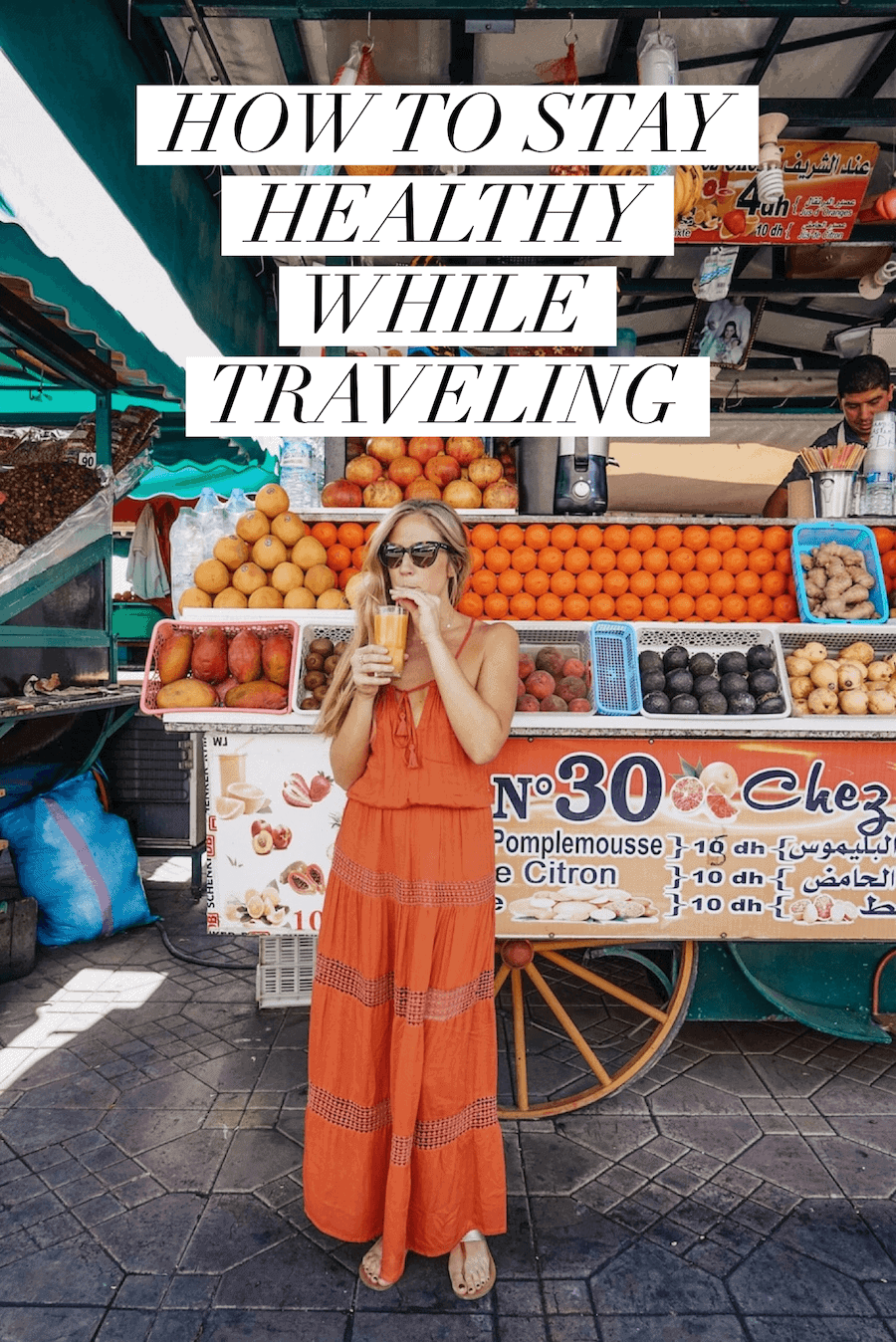

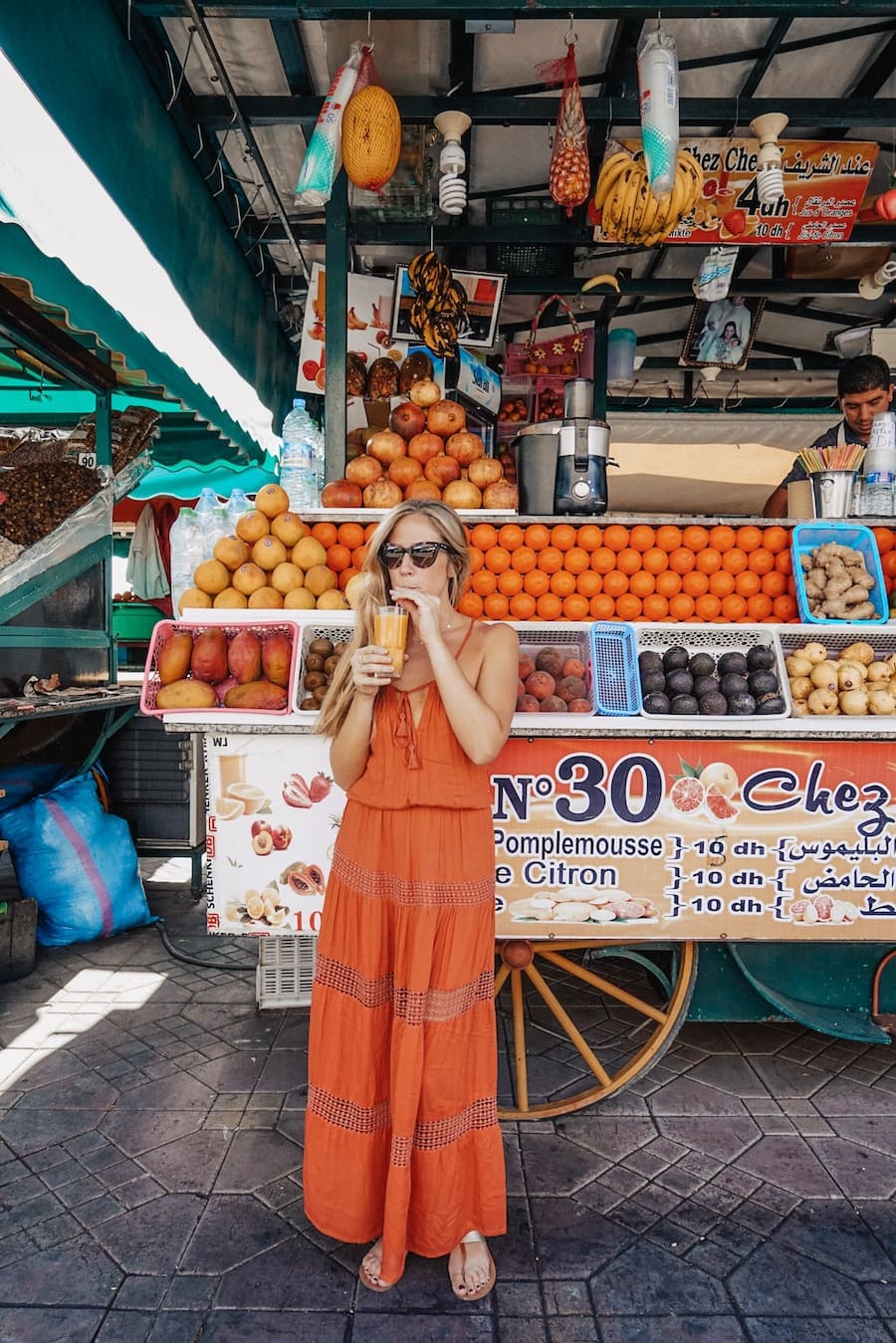
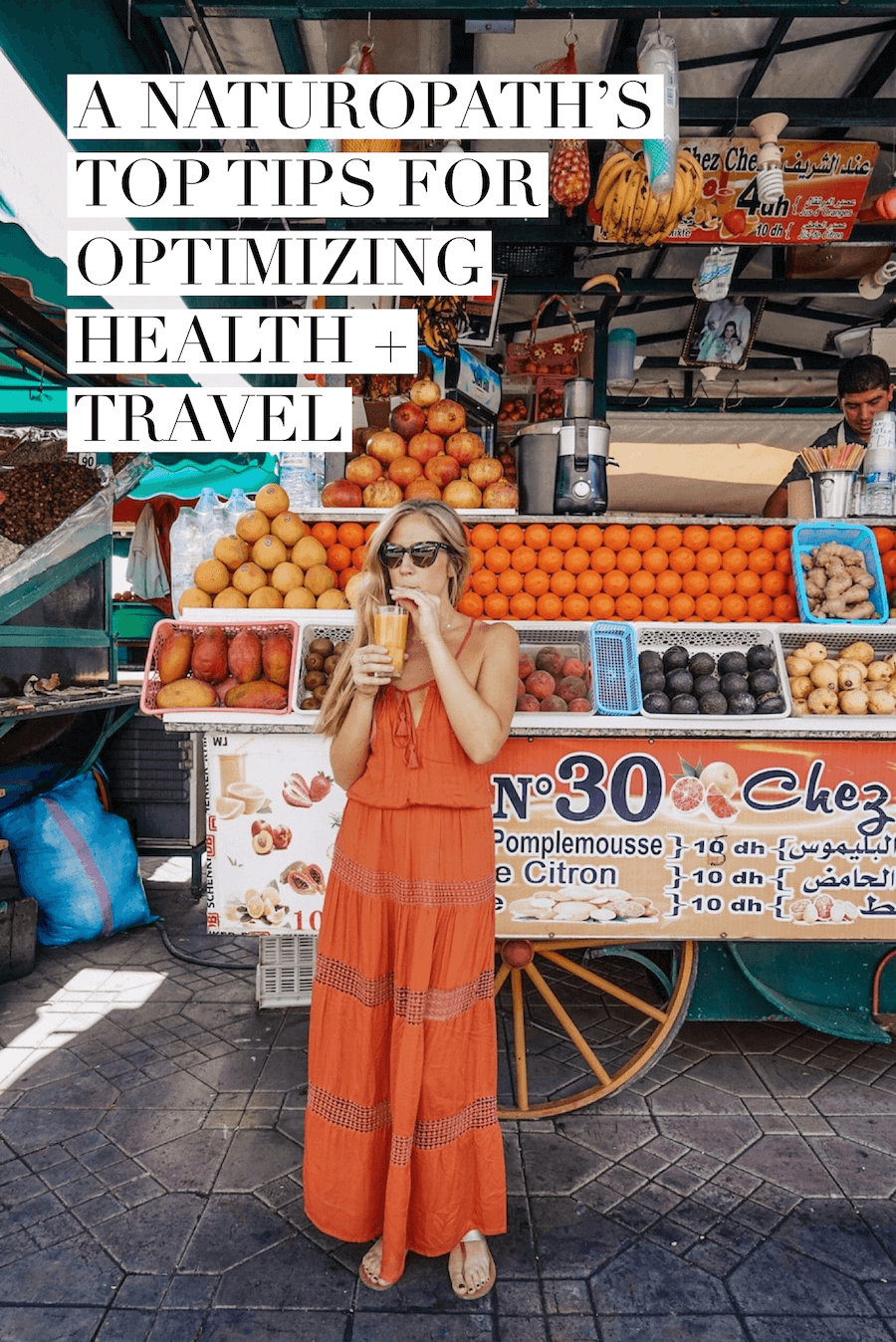
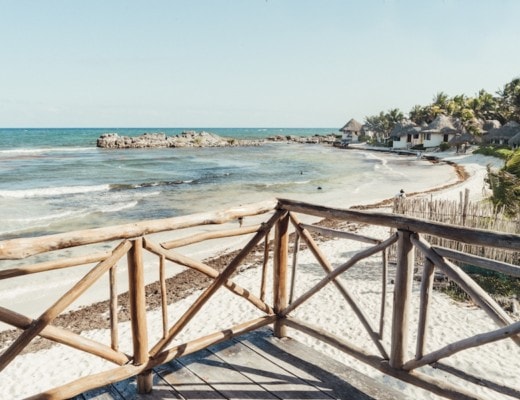

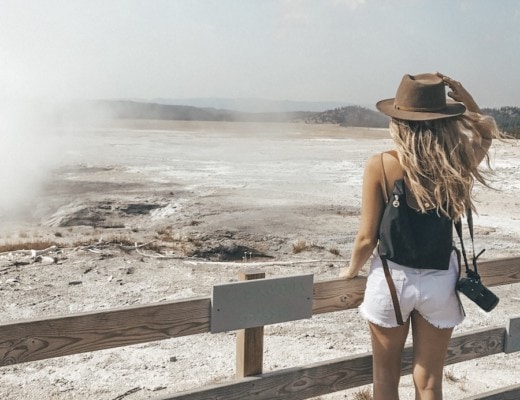








No Comments